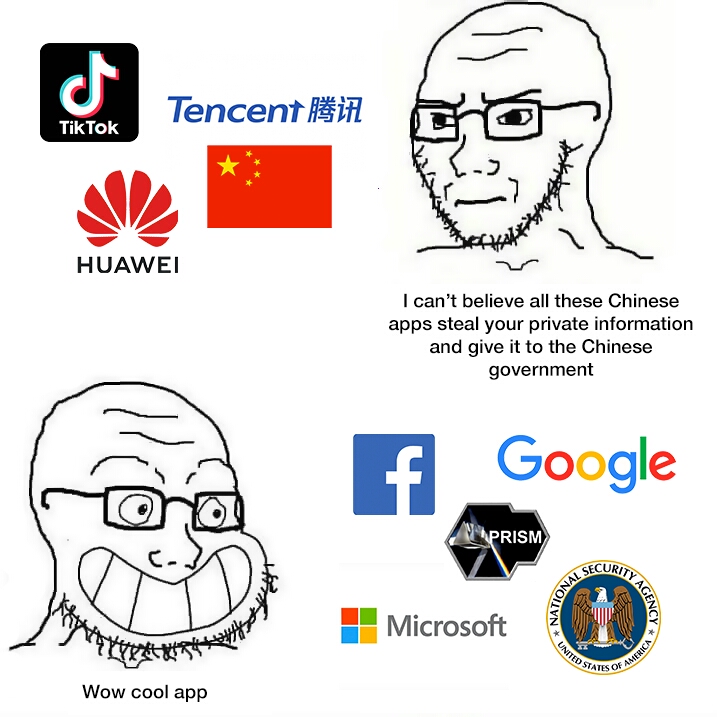You are being watched. Private and state-sponsored organizations are monitoring and recording your online activities. PrivacyTools.io provides services, tools and privacy guides to counter global mass surveillance. Established in 2015 after Edward Snowden's revelations, and is now the most popular privacy website.

Hundreds of companies are collecting, aggregating and trading your personal data without you knowing anything about it. Incogni removes them for you. Available for US, UK, Canada, Switzerland, and EU residents only. 30-day money-back guarantee. Cancel anytime. Read our Incogni review. 50% off for a limited time: Sign up now.

A modified version of Firefox designed to increase protection against tracking and fingerprinting techniques, while also including security improvements.

Based in The Netherlands. Operating since 2018. Obfuscated, RAM-only servers. Audited by a reputable German cybersecurity firm, Cure53. Currently, 82% off + 2 months FREE.

First choice for privacy email accounts. User-friendly web client or third party desktop clients like Thunderbird are supported. Unlimited aliases. 10GB email storage. Fair and transparent pricing with a free 7-day trial. Supports import of existing contacts. Paid plans enable custom domains.
50% off for a limited time with this sign up link.

Anonymous account creation, no KYC required. Cryptocurrency payments are accepted upon request, email: [email protected]. The free plan offers 10 GB storage forever. Fair paid plans: 20 GB for €10.68 and 200 GB for only €41.88 yearly. The biggest advantage over competitors are the lifetime plans that offer 2 TB forever for a one-time payment of €299. Audited by Securitum, a leading European security auditing company.
Encrypted files are stored in the EU: France, Germany and Poland. The company is based in Spain.

Shredding files and wiping unallocated disk space to minimize data remanence.

Easy to setup within minutes. Comes with setup guides for all systems. 300,000 queries/month for free, after that it will just work like a classic non-blocking DNS service.

Dedicated privacy browser with automatic tracking protection and ad blocking. With Focus, your pages load faster and your data stays private.

No phone number or email address is required to signup. Similar functionality like Element, but still in an earlier stage of development. Decentralized servers routed through Lokinet.

Blog post about the new Brave Search beta. Based in the US. Launched in June 2021.

It runs inside your current operating system and is effortless to set up, even for complete beginners. All your internet traffic gets automatically routed through the Tor network.
"Nothing to hide is an incomplete sentence. Nothing to hide from whom? Surely, you want to hide your children from abusers and predators? Don't you want to hide your banking details from con artists and fraudsters? Your identity from identity thieves. Your location from burglars, your car keys from car thieves, or your blood type from rich mobsters with kidney problems.
We don't know who are any of these things. So, we should protect ourselves from all of them, in effect we have everything to hide from someone, and no idea who someone is." Source: User cortic on Hacker News.
We're going over the requirements and criteria in order for a privacy tool or service to be listed.
Open-source: We love the open-source community. Software and services recommended on PrivacyTools.io are open-source unless marked Closed-Source. Since almost all of our entries are open-source we've decided not to point that out every single time. In some cases, developers decide to release the client source code but not the server or backend code. The tag Partially Open-Source is used for these entries.
Usability: Is the app or service user-friendly and easy to use? A modern and well-designed interface makes it easy to understand for users and therefore can be widely adopted. Generally, we don't recommend command-line interface (CLI) tools, but there can be exceptions if there is no other alternative. Affected entries are tagged with if they require a complicated setup or usage.
Active development: Were there any recent updates? A privacy tool or service that is still under active development is by far preferred over outdated projects. Exceptions: No alternatives are available, or the tool is in a stable state with no known issues that could pose a security threat or leaks that could harm your online privacy.
Cross-platform: Tools and services that are available on several devices and operating systems are preferred to be listed here. We believe it's making the life of the end user easier, and it helps to convince users to switch to a privacy-respecting alternative.
Publicly available: Invite only services, providers and tools are not getting listed. To convince users to switch to more privacy-respecting alternatives, the onboarding process should be as easy and fast as possible.
Jurisdiction: Ideally providers, their companies, and CEOs listed here are not based in a Five Eyes country: USA, Canada, UK, Australia, and New Zealand. We likely exclude Chinese or Russian services on a case-to-case basis over censorship concerns.
Privacy Guide: How is the Five Eyes Intelligence Alliance Related to Your Privacy? and Wikipedia: Lavabit: Suspension and gag order and the connection to Edward Snowden.
Security audits: Ideally, the tool/service received an independent security audit from a reputable cybersecurity firm. This is optional, since open-source developers often can't afford the high costs that are involved to hire a security auditor. Picocrypt (Screenshot) is a perfect example of a great privacy tool that struggles to receive funding for an audit.
Entries are marked with a Audited tag in our entries. Examples.
Remark: An audit is not 100% proof that software is safe and secure. Some flaws can be overlooked even by the best auditors. Valid only for a “snapshot” of the code. If new code is added, new vulnerabilities can be introduced.
Business model: Everything became a paid subscription lately. To counter this, we try to find tools and services that you can use for free or offer a freemium version. We also prefer paid services that offer fair money-back guarantee and free trials.
Test of Time: Time often reveals if a privacy tool or service can stand the test of time. If relevant, we provide information when privacy service companies are founded and if any significant incidents happened since founding. Court cases also reveal if the company kept promises to its users. Time is also a good factor to judge if widespread-adoption was achieved and if it was accepted by a broad user base.
Sponsorships: Sponsors can be exempted from the criteria. Generally, our sponsors follow the same ideology and fulfill most criteria innately. More details about our project funding.
Example: NordPass ticks off most boxes of our criteria. It has been audited, is available cross-platform, under active development, and it's easy to use. It has been tagged with Closed-Source, since the company decided not to release the source code to the public.

A term for a regularly published statement that a service provider has not received legal process that it would be prohibited from saying it had received, such as a national security letter. Transparency reports and warrant canaries have an important role to play in the fight against illegal and unconstitutional national security process, including National Security Letters and other secret court processes. Wikipedia
Many of the activities we carry out on the internet leave a trail of data that can be used to track our behavior and access some personal information. Some of the activities that collect data include credit card transactions, GPS, phone records, browsing history, instant messaging, watching videos, and searching for goods. Unfortunately, there are many companies and individuals on the internet that are looking for ways to collect and exploit your personal data to their own benefit for issues like marketing, research, and customer segmentation. Others have malicious intentions with your data and may use it for phishing, accessing your banking information or hacking into your online accounts. Businesses have similar privacy issues. Malicious entities could be looking for ways to access customer information, steal trade secrets, stop networks and platforms such as e-commerce sites from operating and disrupt your operations.
Privacy tools are software that can help people control the information that they share with others. They are also known as privacy software, privacy apps, and privacy utilities. Many privacy tools and services can be downloaded or used for free, while others are commercial services that charge a monthly subscription fee. Privacy tools are software that can help people control the information that they share with others. They are also known as privacy software, privacy apps, and privacy utilities.
Open-source software is an application whose source code is available to modify. Therefore, businesses can use these tools to create security solutions that are tailored to their specific security needs. Some of the benefits of using open-source software include reliability, as it is created by expert developers and sometimes volunteers. This creates an opportunity for other experts to check for flaws and correct them. In the end, you get software that is very resilient and highly reliable for crafting security solutions.
Such privacy tools are also flexible. Unlike proprietary software where the vendor sets limits and lock-ins that prevent some functions, these tools are highly flexible for use in various applications. Besides, users do not have to follow a rigid set of requirements when using the software.
If you have been browsing online, making transactions, and interacting with others online without any form of security, the chances are someone is collecting your data, tracking you, or looking for ways to manipulate your data. It is time to take control of your data by choosing the right privacy tools for your activities. There are various tools for your security, each offering specific qualities to deal with online challenges. Read on to determine the best privacy tools for individual use and for your business below.

Privacy in a nutshell. Free and open-source software (FOSS) for the win.
"Privacy is the ability to seclude any information about themselves from access or scrutiny by other parties. This way, they can express themselves selectively and prevent others from accessing their information. Unfortunately, governments and marketing companies are always surveying the general population for various reasons, among which are security, marketing research, or even malicious intentions. Privacy tools help us to use internet resources without being surveyed or having our personal space intruded by other parties.
Anonymity is the situation where the identity of the person conducting the activity is unknown. It is part of privacy in that other parties cannot pin a name on the doer of the activities in question. For example, when you are browsing anonymously, the tracking companies cannot tell who is visiting their website. Therefore, they cannot follow up with marketing or any due to your online behavior.
Encryption is the technique of translating data from one form to another so that only people with the right decryption key can access and understand the data. Encryption prevents criminals from tapping and hacking data on transit for malicious reasons. Encryption is usually part of privacy. On the other hand, online security involves the use of tools to prevent issues such as intrusion of privacy, access and theft of personal and company data, phishing, and attacks on the online tools. These privacy tools help you enhance your anonymity when conducting activities online.
Privacy tools listed on this page are all open-source unless marked otherwise: Criteria.

Based in The Netherlands. Operating since 2018. Obfuscated, RAM-only servers. Audited by a reputable German cybersecurity firm, Cure53. Currently, 82% off + 2 months FREE.